This was an amphibious trip from Cordova to Valdez, involving a lot of paddling and a lot of walking. For the first time all summer, we had a significant amount of rain, and for the first time since we hit the Wrangells, we had a significant amount of bushwhacking. Read journal entries and pictures below.
8/25/04 - day 1 |
| Barely out |
|
We didn't get far today, unless you count our many laps around the vast area that is downtown Cordova. Errands always take longer than we expect them to, and we wanted to do laundry, take showers, get our pictures, buy string and aquaseal and vaseline, get tide tables, charge batteries, check email, and mail stuff away. Of course we also had to eat out once at the mexican place and once at the pizza place, get ice cream bars and juice at the grocery store, brose in the bookstore, and stop in at the cultural center. Much of our slow progress at accomplishing our errands can be directly attributed to gluttony.
|
 |
|
Wandering around into civilization in matching burgundy rain suits, complete with backpacks and ice axes, I feel sometimes like the circus is coming to town. And we are the circus. Everyone asks us what we're up to; if we buy something from them at a store, or are waited on by them at a restaurant, and sometimes just if we walk by on the street or do nothing at all. We've been stopped by two separate curious Cordovans who merely saw us from their cars. Everyone has been very friendly. It's a nice town. We ran into David Grimes again at the library, which was cool.
|
|
After spending weeks in ice cold rivers of glacial sediment, we crossed from Cordova in the surprisingly warm, clear, blue-green water of the ocean. I can hear the ocean lapping at the cliffy beach below us, and smell the salt on my wet jacket. We have entered a new realm. |
|
We started so late we had time only for the first short crossing, to a large island with pretty cliffs of folded rock. We can still see the lights of Cordova, but no broken glass litters the campsite, and I feel like we are on our way.
|
|
8/26/04 - day 2 |
| Coming of the rains |
 |
The rains have come. The world has suddenly shifted from blue and gold to misty layers of green and grey. I am wet and soggy, most of our gear is wet and soggy, and the world is dripping with its newfound wealth of water. As we paddled, the opaque fog of rain drifted around the bays, alternately dripping and pouring, sending bright white drops of rain bouncing off the calm ocean. The sea was a carpet of pattering ripples, and the rain slowly filled our boats. |
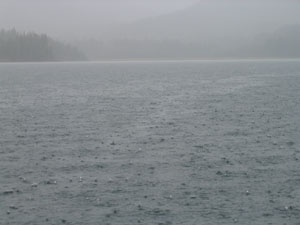 |
We spent most of the day paddling, bouncing from bay to bay and along the coast. The wind this morning died down just as the rain came up, and without wind waves to fight, the little boats really do make about two miles an hour. I am reminded of kayaking, paddling along by forested hillsides and watching them turn from fuzzy lumps of green to individual trees, and finally to branches as we approach. These boats are none too efficient, but they are easy to carry above the high tide line at night, and are currently acting as our ground cloth. |
 |
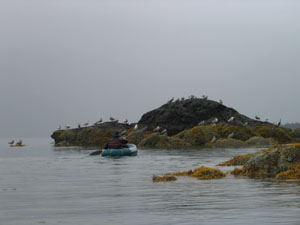 |
|
Curious otters watched us as we paddled along, and a few seals poked their heads up. But the weirdest by far was the sea lions. We thought they were whales at first, making the whooshing noises of air being expelled at the sunrise. We heard their whooshes several times before I first caught a glimpse of them. They were red toothy mouths, sharp and vicious looking, poking above the surface. Under the water, the two gaping mouths were attached to sleek brown bodies, swimming along and following our rafts. We saw them poke up, and they were definitely sea lions, though I don't understand the air-expelling behavior. Those sharp-toothed mouths would make short work of our small inflatable boats and I was not entirely unhappy to see them leave. |
|
We spent most of our day on the water. But in accompaniment to the rain, we made a brief foray into the rainforest, cutting across a peninsula. We started on an old gravel logging road, and where it left our way we turned to follow a remaining patch of unlogged forest. We walked in the wet under hemlock and spruce, over mossy logs through skunk cabbage and ferns, through bushes loaded with enormous huckleberries, and on top of a field of plump-ripe wine berries. It was quite a change from the desiccation of the Wrangells, or the alder thickets of the Copper River. In the rainforest, I don't really even mind the rain. |
|
We followed a small stream out from the forest to the ocean. At first we caught the smell of rotting fish. Then we saw a few decayed fish carcasses that had been dragged up small trails away from the stream. All quite normal for a salmon-spawning stream. But as we reached the ocean, the rotting salmon stench increased tenfold, and there they were, lying dead on the gravel by the dozens, or flopping around in a few inches of water where it pooled, desperately trying to make it up the stream that wasn't there. In this dry year, the stream was too low for the salmon. And what a crop of salmon they were. Just in the head of little bay, in the intertidal zone before the stream became too shallow, the water swirled with the fins of waiting fish. As we walked along the bank, stepping over their dead brethren, the fish started hurriedly swimming away, setting up a wave with their massive motion. There were easily thousands of fish there, trying to return up that stream. Tens of thousands of dogs and pinks, milling or flopping in the shallow water or rotting on the banks, and hardly even a scavenger in sight. The salmon must be abundant that not even the seagulls had bothered to eat the eyes of the dead. If these rains do not swell the stream soon, all of these fish are as doomed genetically as they are physically. |
|
8/27/04 - day 3 |
| Detour through the alpine |
I am as sheltered from the storm as I can be, buried entirely in the sleeping bag, hidden under our shelter and listening to the pounding of the rain. The sleeping bag is the one piece of gear we own that is not yet entirely sodden, and I am appreciating it. I hope our shelter works well enough that it is still true in the morning.
|
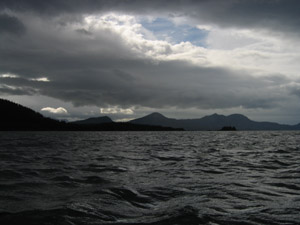 |
We made our first real foray onto land today, crossing Sheep Bay in the morning and then cutting up over the peninsula, headed for Port Gravina. The forest was thick with huckleberry bushes down low, which might have been nice if the huckleberries weren't so bad. As it was, they were just thick bushes with plump blue tempting berries that were only worth eating maybe 5% of the time. But soon we hit a series of beautiful meadows with small tasty blueberries and a clear rushing stream. At the outlet, it was like we saw yesterday, with thousands of fish swimming the bay, and the low river burbling, with the sounds of flailing fish trying to thrash their way up it. Beyond the pink salmon at the ocean, the stream looked pretty and inviting. |
 |
|
The meadows led us to a clear blue-green gem of a lake in a bowl of granite. As we sat there, eating wine berries and looking at the map, we decided the alpine was so beautiful that we should do this long traverse instead of cutting down to the ocean right away. And it was beautiful, in a very classic alpine way, with granite cliffs and granite boulders, mossy slopes, little waterfalls, lakes, and goats. |
 |
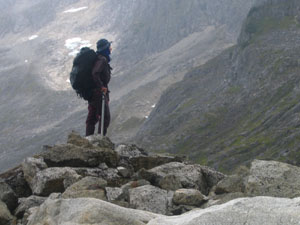 |
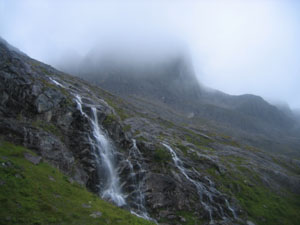 |
The slow travel on those boulders is one of the main reasons we're still on the ridge. The goats let us get close today, as our scent and sound were obscured by waterfalls and the increasing pounding of the rain. Unlike our recent forays into the mountains, here it was wet. Water poured heavily from the sky and down the slope, filling all the pools, soaking the moss and running over the rocks in little waterfalls. It was also making us increasingly sodden. |
|
We certainly weren't the first ones to be scrambling around on our bizarre traverse. The first thing we saw was a rock laced with orange flagging tape, arranged to be visible from the air. Then there were more bits of flagging. Finally, the trail led to one very flat hunters tent. The tent and ground cloth were still in fairly good shape, though the poles and fly were shot. It can't have been there much more than a year. We entertained ourselves with speculation on why the hunters left a set-up tent and one water jug, while we debated carrying out their ground cloth. Too heavy.
|
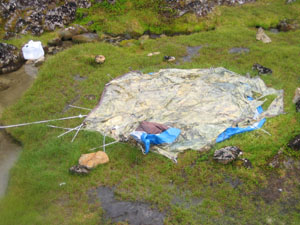 |
|
We pushed to be in the krumholz by dark, and I'm writing while awkwardly perched on Hig's sleeping body, trying to keep warm. I think it is bedtime now.
|
|
8/28/04 - day 4 |
| Down and back to progress |
|
We started today on the ridge of our detour. The ground all around us was soggy, the pot held 1.8 cm of water as measured by a page of this journal. But it wasn't raining. It took awhile to convince myself to crawl out of our warm dry hole and into my wet cold clothing and the wet cold world. |
 |
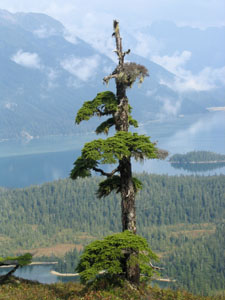 |
Once we got going, the ridge was a nice mix of meadows and krumholz hemlock, with soggy puddles, a few blueberries, and views of the crenulated coastline up the bay. The krumholz were impressive, and occasionally too dense to get through anywhere with a pack on, and involved wriggling packless through a small hole in a fence of branches. It's actually the first time I've hit vegetation thick enough to force me to take my pack off. |
Down from the ridge was a winding and twisting path to the ocean, traversing around small granite cliffs and butt-sliding down steep and slippery meadows. The clouds disintegrated into a puffy jumble above us, and wispy floaters below. The sun broke out at times, providing a view of shifting light on the bay behind the twisted krumholz spruce on our ridge. The huckleberries on this side of the mountain were a bit more worth eating than the ones on the other side, and I did find wine berries to snack on. Hig picked up hedgehog mushrooms for our lunch. And then we were at the ocean.
|
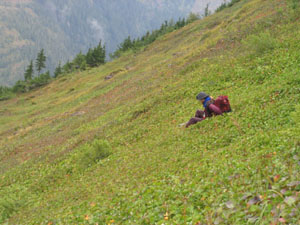 |
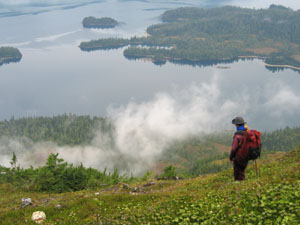 |
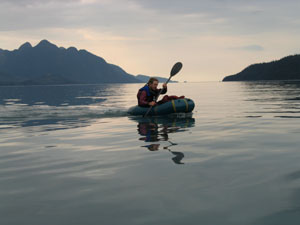 |
And out came the rafts. We've had enough days rafting this summer that the set up to paddle has gotten far quicker and more convenient. The only problem this time was that Hig's raft was deflating quite rapidly as we paddled along the shore. Fortunately the culprit turned out to be gravel in the valve, and with a clear valve we started across the glassy calm waters of Port Gravina. There was a barely noticeable swell, but the only ripples on that shiny water came from our rafts, the occasional duck, or the fish leaping four feet into the air. They looked lively and tasty, but we didn't quite feel like taking the time to figure out how to catch one.
|
|
The water on the far side of the bay was a milky blue-green where the fresh glacial water flowed out over the salt. Each paddle stroke dug into the mix zone and left a streak of dark clear water in its wake.
The tide was against us, and we thought the currents out the bay might stop us. But we pushed along up the coast with seals, eagles, jumping fish, and only a little current against us.
|  |
|
We stopped mostly because we wanted our meal and our siesta. I cooked up the meal of split peas and quinoa, with hedgehogs and puffballs and goose tongue, while Hig fixed the giant hole in the shoulder of his rain suit.
When we were ready to leave, the tide was well out, and the mudflats were starting to show. Walking looked more fruitful than paddling, so the rafts disappeared into he packs, the paddles morphed into walking sticks, and we set off up the bay on rocks and mud. We slid around, leaving our tracks next to older sign of humans and bears.
The mudflats turned into a squelchy swamp of grass laced with channels, and bear-flattened trails through the grass. We saw their leavings of fish parts, but we still haven't seen any bears.
Now we're headed to Port Fidalgo, camped on a ridge of trees and cranberry, perched on a meadow in the pass.
|
|

